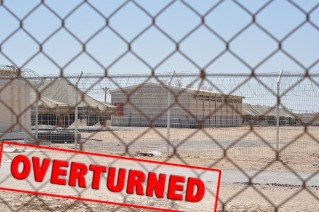 CC. Photography by Gilad Liberman
CC. Photography by Gilad Liberman
In an extremely important decision yesterday (September 16), the High Court of Justice ruled following an ACRI petition that the prolonged imprisonment of asylum seekers in administrative detention is unconstitutional and overturned the Anti-Infiltration Law.
Under the (now overturned) law, passed in January 2012, refugees and asylum seekers could be held in administrative detention – without trial – for at least three years. The extended panel of nine Justices, headed by Supreme Court President Asher Grunis, unanimously ruled that the administrative detention of the refugees violates the Basic Law: Human Dignity and Liberty and disproportionately impinges on a person’s right to freedom. The Court gave the State 90 days to examine each of the detainees’ cases individually and release all those who are entitled to release under the original Entry to Israel Law. Unlike the Anti-Infiltration Law, the Entry to Israel Law does not allow extended detention of persons against whom deportation proceedings are not underway.
Some 2,000 women, men and children are currently being held in harsh conditions without trial under the law. The vast majority of the detainees are citizens of Eritrea and Sudan – countries whose citizens, according to the government’s own directives, cannot be deported due to the threat to their lives. ACRI maintains that the law severely infringed upon human rights as Israeli and international law prohibits the detention of immigrants if it is not for the purpose of deporting them. In addition, the detention of asylum-seekers fleeing for their lives, who suffered through torture camps in Sinai, is likely to substantially aggravate the harm done to their health and welfare. Furthermore, deterring new refugees from traveling to Israel cannot possibly be used as a sufficient justification for the detention of past asylum seekers.
But the struggle is not over…
With the Law’s main clause overturned by the High Court today, we are hopeful that thousands of innocent asylum seekers will finally be freed after spending a year and a half in administrative detention. However, we also brace ourselves for a potential legislative backlash in the Knesset, where already today many have spoken both for a drive to quickly re-legislate “anti-infiltration” measures, and against the High Court’s very authority to overrule such unconstitutional legislation.
Muatsam Ali, an asylum seeker from the Darfur region of Sudan welcomed the repeal, but noted that: “this law is not about the situation of refugees in Israel. The problem is that Israel doesn’t have a policy for dealing with refugees. We live here without basic rights, and no one genuinely investigates our stories to determine if we are eligible for asylum. I have friends who have been imprisoned owing to this law. I’m glad that they can get out of prison, but they don’t know what is in store for them once they are released. I’ve also been released, but I’m unable to work. They call me an infiltrator, a migrant worker and a criminal.
I am seeking asylum. I do not want to be a refugee, but I have no choice. War is still waging in Darfur and I fled because it was dangerous for me there.”
Dwight Demoz, an asylum seeker from Eritrea: “I’m glad the law has been overturned because it’s illogical to place people in prison for more than a year without a release date. These people suffered through harsh circumstances in their countries and on their way to Israel. They will be released, and left at the central bus station, and we don’t know what will happen to them once they’re let go. We fled from dictatorships in order to be free and safe. It can’t be that the only option for refugees is to stay on the streets or in jail.”
ACRI’s petition was submitted by Attorney Oded Feller together with a number of key partners:
• Attorney Yonatan Berman of the Clinic for Migrants’ Rights at the Academic Center of Law and Business in Ramat Gan,
• Attorney Anat Ben Dor of the Refugee Rights Clinic at the Tel Aviv University Faculty of Law, and
• Attorney Asaf Weitzen of the Hotline for Migrant Workers.
Related Materials
Click here to read a summary of the ruling translated into English.
Click here to read key excerpts from the petition.
Click here for further information on the law and background of the petition







